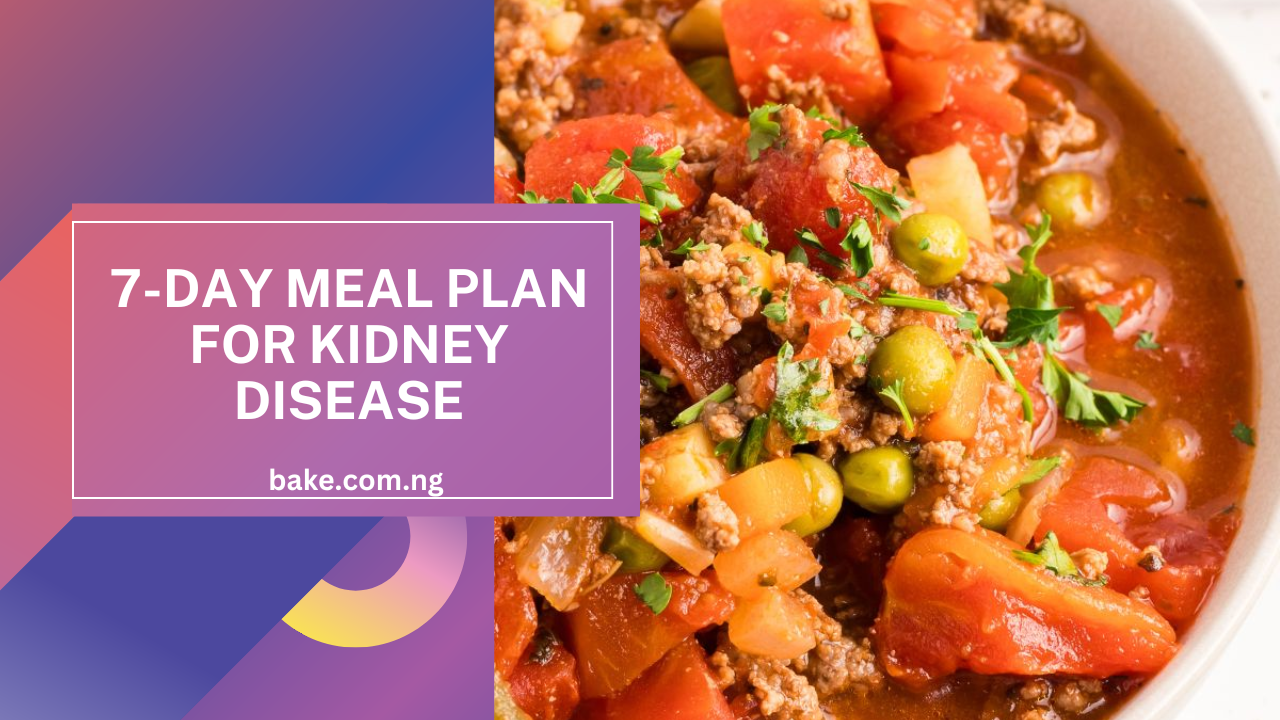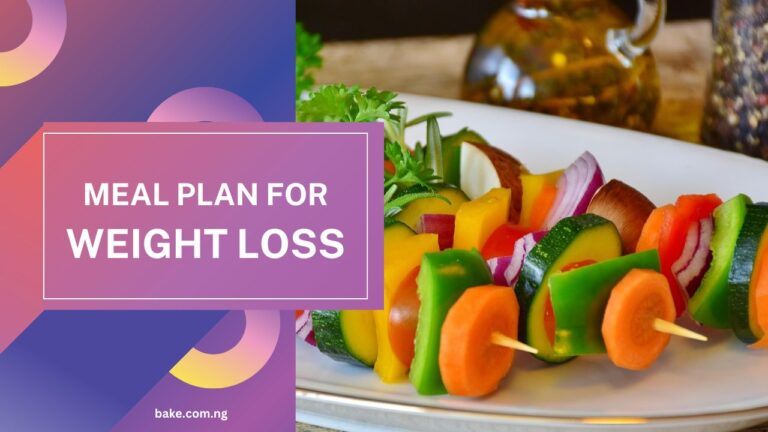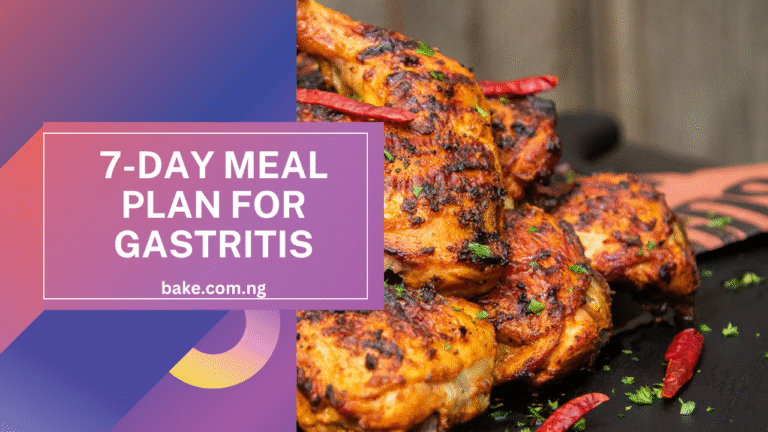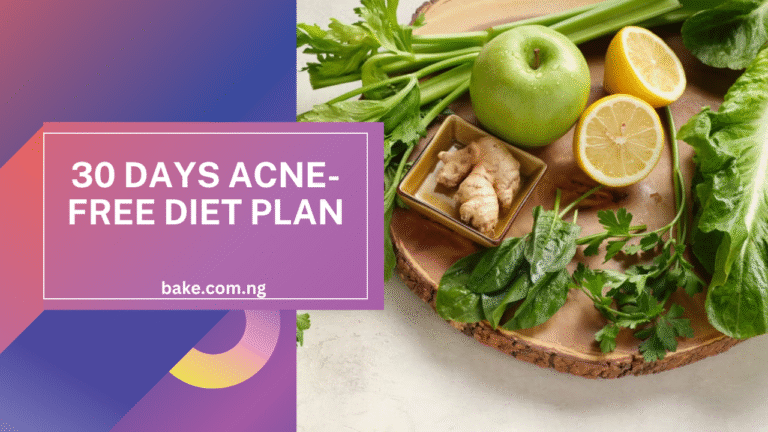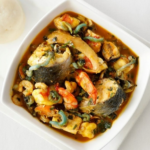Living with kidney disease means paying extra attention to what you eat. The kidneys play a vital role in filtering waste and excess fluids from your blood. When they’re not functioning properly, your diet becomes an essential part of managing your health.
A well-planned 7-day kidney disease meal plan can help you reduce the workload on your kidneys, control symptoms, and maintain good nutrition. In this guide, we’ll walk through everything you need to know — from dietary principles to a sample 7-day meal plan created specifically for individuals with chronic kidney disease (CKD).
Understanding Kidney Disease and Diet
Before diving into the meal plan, it’s important to understand why diet matters for kidney health.
When your kidneys are damaged, they can’t properly filter out waste products such as sodium, potassium, and phosphorus. These minerals, if not controlled, can accumulate in your body and lead to serious health complications.
Therefore, a kidney-friendly diet focuses on:
- Low sodium: Helps control blood pressure and reduce fluid retention.
- Controlled potassium: Prevents heart rhythm issues.
- Limited phosphorus: Keeps bones healthy and prevents calcification.
- Adequate protein: Too much protein can strain the kidneys, but too little may lead to muscle loss.
- Plenty of fruits and vegetables: Helps provide fiber and essential nutrients without overloading the kidneys.
Always remember — your exact needs depend on the stage of kidney disease, your lab results, and whether you’re on dialysis. You should work with a renal dietitian before starting any meal plan.
Key Nutritional Guidelines for Kidney Disease
Here’s a quick summary of what to focus on:
| Nutrient | Recommendation | Reason |
|---|---|---|
| Protein | Moderate intake (0.6–0.8g/kg body weight) | Reduces kidney strain |
| Sodium | ≤ 2,000 mg per day | Controls blood pressure and swelling |
| Potassium | Adjust based on lab results | Prevents heart problems |
| Phosphorus | ≤ 800–1,000 mg per day | Protects bones and heart |
| Fluids | As recommended by your doctor | Prevents fluid overload |
7-Day Kidney Disease Meal Plan
Below is a balanced and practical 7-day kidney-friendly meal plan. Portions can be adjusted depending on your calorie and protein needs.
Day 1
- Breakfast: Oatmeal made with water, topped with blueberries and a sprinkle of cinnamon.
- Lunch: White rice with grilled chicken breast and steamed green beans.
- Snack: Unsalted crackers with cream cheese.
- Dinner: Baked tilapia, mashed cauliflower, and sautéed zucchini.
Day 2
- Breakfast: Low-sodium toast with scrambled egg whites and a slice of apple.
- Lunch: Pasta with olive oil, garlic, and chopped bell peppers.
- Snack: A handful of unsalted popcorn.
- Dinner: Lean beef stir-fry with carrots and cabbage over white rice.
Day 3
- Breakfast: Cream of wheat with strawberries and almond milk (unsweetened).
- Lunch: Turkey sandwich on white bread with lettuce and light mayo.
- Snack: Rice cakes with peanut butter (small portion).
- Dinner: Grilled salmon, couscous, and roasted asparagus.
Day 4
- Breakfast: Smoothie made with unsweetened almond milk, frozen berries, and a spoon of oats.
- Lunch: Boiled sweet potato and mixed vegetables (low-sodium).
- Snack: Apple slices with low-fat cream cheese.
- Dinner: Chicken stew with white rice and sautéed spinach.
Day 5
- Breakfast: Plain pancakes made with egg whites and topped with a little honey.
- Lunch: Tuna salad (use low-sodium tuna) with lettuce and cucumber.
- Snack: Graham crackers.
- Dinner: Baked chicken thighs, boiled carrots, and white rice.
Day 6
- Breakfast: Rice cereal with sliced pears.
- Lunch: Vegetable soup (low-sodium) with white bread roll.
- Snack: Unsalted pretzels.
- Dinner: Baked cod fish, steamed broccoli, and pasta tossed with olive oil.
Day 7
- Breakfast: Scrambled egg whites with onions and toast.
- Lunch: White rice with ground turkey sauce (lightly seasoned).
- Snack: Fresh pineapple cubes.
- Dinner: Grilled chicken, mashed potatoes, and steamed carrots.
Foods to Avoid in Kidney Disease
To protect your kidneys, you must limit or avoid the following:
- High-sodium foods: Canned soups, processed meats, salty snacks.
- High-potassium foods: Bananas, oranges, potatoes, avocados, tomatoes (if your levels are high).
- High-phosphorus foods: Dairy products, cola drinks, chocolate, nuts, and seeds.
- Processed foods: Fast food, instant noodles, and frozen dinners.
- Protein overload: Excess meat, eggs, or protein supplements (unless advised by a doctor).
Helpful Tips for a Kidney-Friendly Lifestyle
- Read labels carefully: Look for “low sodium” or “no added phosphorus” options.
- Cook at home: Control ingredients and avoid hidden salts.
- Stay hydrated wisely: Follow your doctor’s fluid intake advice.
- Use herbs for flavor: Basil, rosemary, parsley, and garlic add taste without salt.
- Track your meals: Keep a food diary to identify what works for you.
Sample Grocery List for Kidney Diet
Here’s a kidney-friendly grocery list to make shopping easier:
- Proteins: Chicken breast, turkey, fish (tilapia, cod, salmon), egg whites
- Carbs: White rice, pasta, white bread, oats, couscous
- Vegetables: Cabbage, green beans, zucchini, bell peppers, carrots
- Fruits: Apples, berries, pears, pineapple (in moderation)
- Others: Olive oil, low-sodium seasonings, almond milk, unsalted snacks
Final Thoughts
Managing kidney disease through diet doesn’t have to be difficult or restrictive. With the right guidance and a thoughtful 7-day meal plan, you can enjoy delicious meals while protecting your kidney health.
Remember: always consult a renal dietitian or healthcare professional before making significant dietary changes, as individual needs vary based on your kidney function, medications, and lab results.

